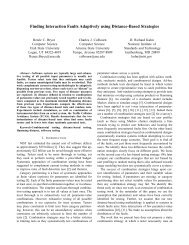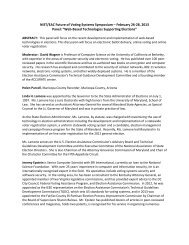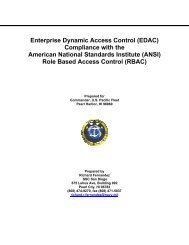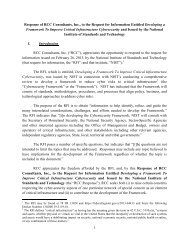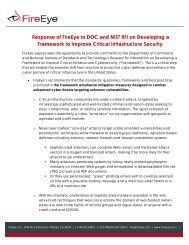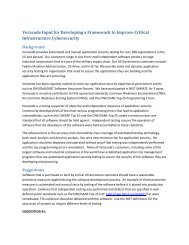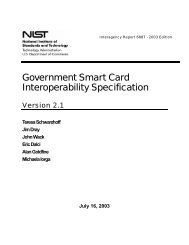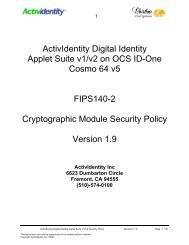Part 1: General - Computer Security Resource Center - National ...
Part 1: General - Computer Security Resource Center - National ...
Part 1: General - Computer Security Resource Center - National ...
Create successful ePaper yourself
Turn your PDF publications into a flip-book with our unique Google optimized e-Paper software.
March, 2007<br />
7. Symmetric key wrapping key: Symmetric key wrapping keys are used to encrypt other<br />
keys using symmetric key algorithms. Key wrapping keys are also known as key<br />
encrypting keys.<br />
8. Symmetric and asymmetric random number generation keys: These keys are keys used to<br />
generate random numbers.<br />
9. Symmetric master key: A symmetric master key is used to derive other symmetric keys<br />
(e.g., data encryption keys, key wrapping keys, or authentication keys) using symmetric<br />
cryptographic methods.<br />
10. Private key transport key: Private key transport keys are the private keys of asymmetric<br />
(public) key pairs that are used to decrypt keys that have been encrypted with the<br />
associated public key using a public key algorithm. Key transport keys are usually used<br />
to establish keys (e.g., key wrapping keys, data encryption keys or MAC keys) and,<br />
optionally, other keying material (e.g., Initialization Vectors).<br />
11. Public key transport key: Public key transport keys are the public keys of asymmetric<br />
(public) key pairs that are used to encrypt keys using a public key algorithm. These keys<br />
are used to establish keys (e.g., key wrapping keys, data encryption keys or MAC keys)<br />
and, optionally, other keying material (e.g., Initialization Vectors).<br />
12. Symmetric key agreement key: These symmetric keys are used to establish keys (e.g., key<br />
wrapping keys, data encryption keys, or MAC keys) and, optionally, other keying<br />
material (e.g., Initialization Vectors) using a symmetric key agreement algorithm.<br />
13. Private static key agreement key: Private static key agreement keys are the private keys<br />
of asymmetric (public) key pairs that are used to establish keys (e.g., key wrapping keys,<br />
data encryption keys, or MAC keys) and, optionally, other keying material (e.g.,<br />
Initialization Vectors).<br />
14. Public static key agreement key: Public static key agreement keys are the public keys of<br />
asymmetric (public) key pairs that are used to establish keys (e.g., key wrapping keys,<br />
data encryption keys, or MAC keys) and, optionally, other keying material (e.g.,<br />
Initialization Vectors).<br />
15. Private ephemeral key agreement key: Private ephemeral key agreement keys are the<br />
private keys of asymmetric (public) key pairs that are used only once 10 to establish one or<br />
more keys (e.g., key wrapping keys, data encryption keys, or MAC keys) and, optionally,<br />
other keying material (e.g., Initialization Vectors).<br />
16. Public ephemeral key agreement key: Public ephemeral key agreement keys are the<br />
public keys of asymmetric key pairs that are used in a single key establishment<br />
10 In some cases ephemeral keys are used more than once, though within a single “session”. For example, when<br />
Diffie-Hellman is used in S/MIME CMS, the sender generates one ephemeral key pair per message and the private<br />
key is combined separately with each recipient’s public key.<br />
42




